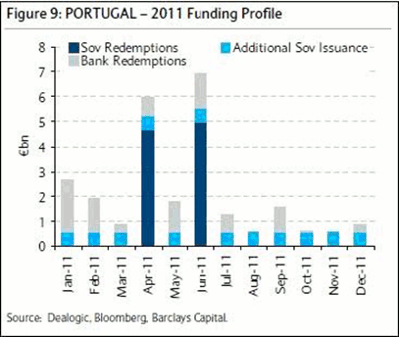The big story in the financial markets on Monday was, of course, Portugal—the next domino expected to fall. According to a poll conducted by Reuters, 85% of dealers expect Portugal to receive a bailout. Portuguese credit default swap spreads have increased to a record high of 548 basis points, which is the same level to which Irish CDS spreads widened before the government was forced to initiate bailout negotiations.
Over the weekend, Die Spiegel, a leading German newspaper, reported that Germany and France were pressing Portugal to accept a rescue package. The Portuguese government denied the need for a bailout as recently as Sunday, but having gone through this twice in the past 12 months, we know that denial is the first step towards acceptance. Both Greece and Ireland vehemently denied the need for bailouts before they were eventually forced into accepting theirs. Portugal’s ten-year bond yield surged above 7%, which means that the borrowing cost is still sustainable, but barely so.
Some investors expect Portugal to ask for a bailout as early as Wednesday, when they have a bond auction scheduled, but the greater likelihood is that they will wait until after the auction is held. Their next T-bill redemption is scheduled for January 21, two days after the Eurogroup/Ecofin finance minister meeting, which is a good platform to discuss Portugal’s situation. Although Portugal only represents a small percentage of total euro zone GDP, its problems have sparked concerns about the creditworthiness of Spain, a country that accounts for more than 10% of the euro area’s GDP.
The market could cope with a bailout of Portugal, but not a bailout of Spain. With no end in sight to the European sovereign debt troubles, things will certainly worsen before they improve. Spain also has a bond auction on Thursday. We don’t expect demand at the two auctions to be exceptionally weak, but that will not stop investors from turning on Portugal.
As indicated in the chart from Barclays below, the Portuguese redemption schedule is very heavy in April and June, which means the country needs to raise money to meet those redemptions. If the liquidity crisis intensifies, their only option could be a bailout.
For forex traders, this news means that any rally in the euro should be seen as an opportunity to sell at a higher level.
By Kathy Lien of KathyLien.com











